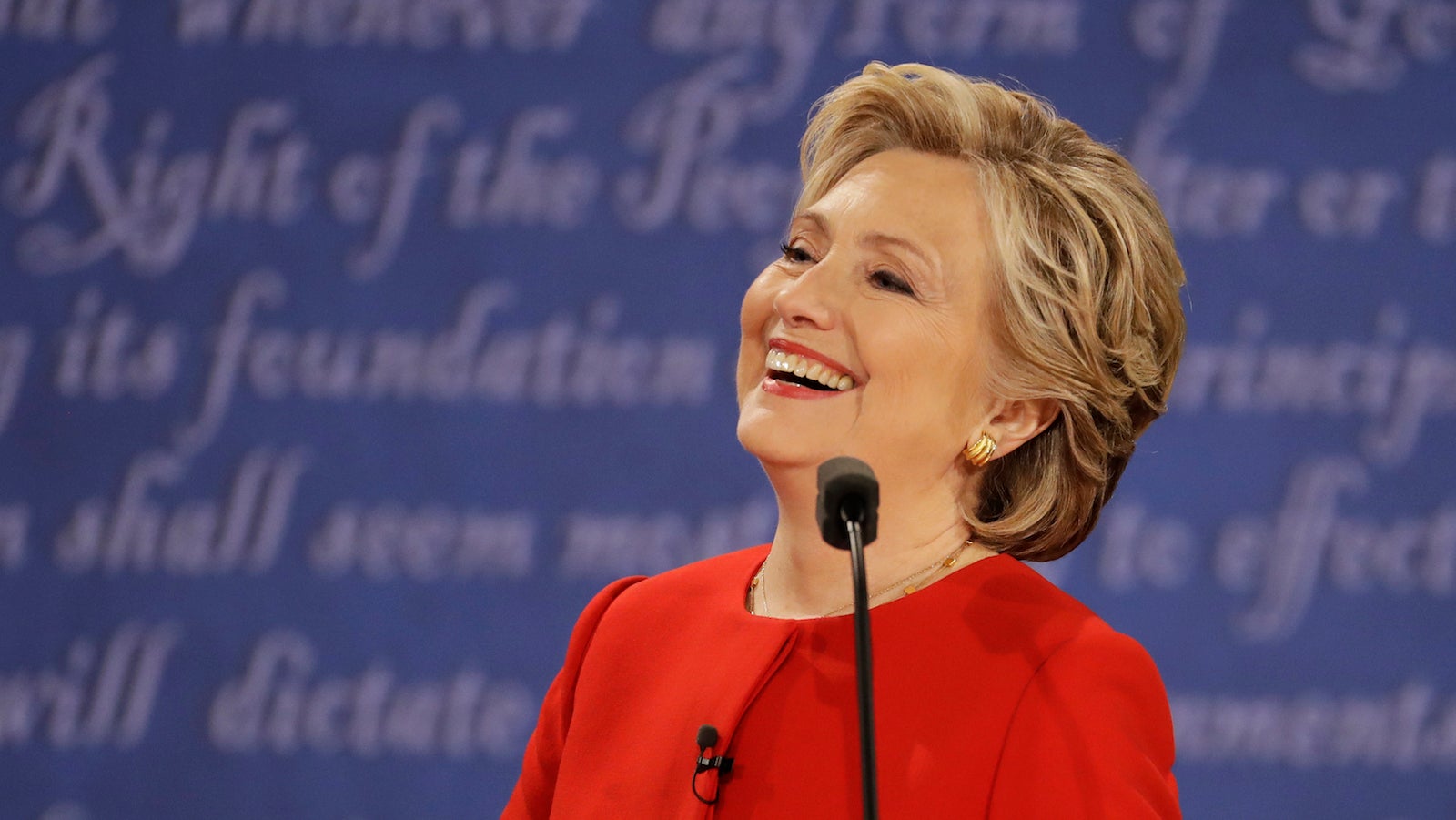Men have been telling Hillary to smile for years. Here’s what happened when she finally did
Throughout her career as a female politician, Clinton has often been chastised for failing to smile.


Throughout her career as a female politician, Clinton has often been chastised for failing to smile.
On Sept. 8 after her appearance at NBC, Reince Priebus, the chairman of the Republican National Committee, took to Twitter to accuse an unsmiling Hillary of being uncomfortable—and secretive. Mitt Romney, a man known for his relatable projections of authentic humanity, put a finer point on the issue when he observed that Clinton’s real problem was an inability to smile. And after a particularly big night for Clinton during the March primaries, Fox News’s Brit Hume congratulated her not on her achievement, but, tediously, on her smile.
According to these smirking men in power—and the countless other faceless strangers who call out to us on the street—women should smile. Yet after Clinton’s first debate round versus Trump, this garrulous car of unsolicited commentators has abruptly rolled up their windows and laid off the horn—suddenly, it seems, men don’t want Hillary to smile anymore.
The change in tone was established by David Frum, a former George W. Bush speechwriter and current Atlantic senior editor, as he wondered aloud on Twitter: “Who told Hillary Clinton to keep smiling like she’s at her granddaughter’s birthday party?” In the aftermath that ensued, he followed up, “Oh dear me, I seem to have said something problematic”—the sort of juvenile, faux-contrite thing grown men are prone to saying, unaware of how they embarrass themselves.
Frum’s comment provoked retaliation, with many noting that Clinton seems damned no matter which direction the corners of her mouth point. But Clinton’s steady smile was not the easily dismissible, plastered-on glaze that Frum perceived. It was a projection of the genuine pleasure she took in consciously earning her victory; an indicator of the confidence she had in calmly and competently dismantling the shrill diversions of her inferior opponent.
“I don’t believe Hillary’s smiling during the debate was insincere or fraudulent,” says Dr. Michael Woodworth, a professor of psychology at the University of British Columbia who specializes in the detection of body language cues key to identifying narcissists and psychopaths. “She genuinely appeared to be—for the most part—enjoying herself, and exuded confidence.”
Clinton’s reassuring smirk formed a relationship with her audience on the other side of millions of television screens. She projected control—a wise-cracking, inside-joking, “You and I both know this is BS, but don’t worry, I got this” attitude, while staying calm and composed. Trump may have said that she doesn’t have “the look,” but her subtle facial expressions silently convey so much more—her literal look is locked and loaded. To quote RuPaul, Hillary serves face.
And Trump? His signature facial expression is like a Cheeto taking a mirror selfie.
Last night, Clinton’s soft smiles were powerful; subtle weapons employed to silently undermine Trump as he spoke. Some believe this was a risky tactic. In a Medical Daily article published on the afternoon before the debate, Dr. Lillian Glass, a psychosocial perceptions expert who is sometimes referred to as “the first lady of communication,” noted she hoped Clinton would refrain from smiling when Trump inevitably says something that is intended to upset her. Glass backed up her assertion by saying that, when Clinton smiles, it looks “phony.”
“There is nothing to suggest the type of smile was indicative of fake disposition or intent,” Woodworth notes. “In fact, if anything, the smiling may have been exaggerated as an attempt to goad Trump into becoming aggressive or flustered, or to make him and his statements appear comical at best. I mean really, at the end of the day, how could her smiles be ‘phony’ when [Trump’s statements] would make any opponent beam?”
Women can hope that commenters move past their preoccupation with Clinton’s smile during political appearances—and with the question of whether women should smile at all. When the Democratic nominee smiles across the podium, it is not because anyone commanded her to smile, and it is not in a bland appeal to seem “nice.” Rather, it is a lip-licking indicator that a good rebuttal is forming in her mind—and how satisfying it will be when she delivers it.